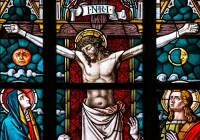Philosophical Essays against Open Theism – ch. 8: Anderson
This is part eight of eleven in a series responding to the essays in Ben Arbour’s edited volume, Philosophical Essays against Open Theism (Routledge, 2019). In this post I tackle chapter 8 by James N. Anderson, “‘May It Have Happened, Lord!’: Open Theism and Past-Directed Prayers” (pp. 121–139). This is one of the more interesting… Read More »

